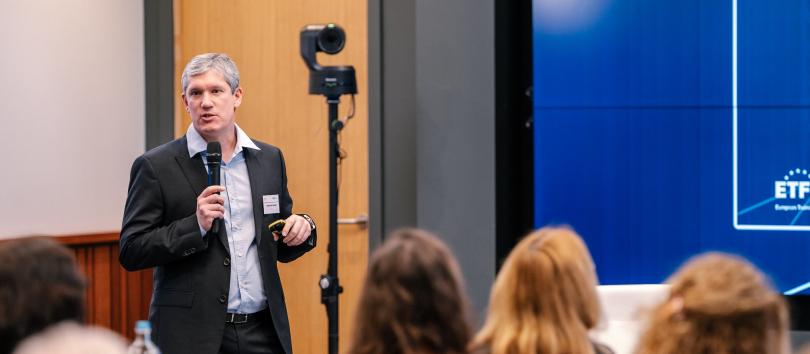
An eye on the future: a conversation with the ETF's Cristiano Cagnin
Cristiano Cagnin's office is not equipped with a crystal ball, but visitors should not let that fool them. Seeing into the future is very much part of his job. An industrial engineer by training, Cristiano's speciality is foresight: keeping a finger on the pulse of emerging developments in geopolitics, technology, innovation and human capital development.
"It's all about exploring alternative future opportunities and bringing value to our stakeholders in the present," he says. "I'm in charge of making sure the ETF's operations are aligned with our long-term strategy."
First steps
Cagnin's career in foresight formally began in 2005, at the European Commission's Joint Research Centre. In 2008, his team was commissioned to produce a report into the factors that would exert an influence on the EU beyond 2025: its success raised the profile of foresight throughout EU institutions in the following years. Cagnin chose that moment to return to his native Brazil in 2012, and apply his expertise to a series of inter-ministerial research projects into sustainable cities and innovative regions financed by the Global Environment Facility and European Commission’s Foreign Policy Instruments. But by 2019 he was back in Brussels, where he helped develop the Commission's Strategic Foresight Reports.
Produced annually, the reports leverage evidence gathering, trend analysis and horizon scanning to assist policy-making in building preparedness and becoming more adaptive.
"They identify what's cooking, the possibilities that may open up in the future, and their potential implications," says Cagnin.
Joining the ETF
In 2021, an opportunity to join the ETF appeared. Although foresight was not part of the initial job description, Cagnin's expertise in the discipline meant it was officially added just six months later.
"My job involves keeping the ETF up-to-date on what's coming up on the horizon in liaison with the European Commission, and how it can be of service to our partner countries and DGs," he explains. "We're currently working to raise the profile of the ETF as a foresight player in Brussels."
To that end, the ETF recently co-hosted a next generation high-level conversation and a foresight workshop on the crossroads between geopolitics, skills and education, and further events are planned to mark the ETF's 30th anniversary this year.
"They are an important way of engaging with selected partners to help develop the ETF's vision of the future and positioning in the present," Cagnin says.
Going forward
For Cagnin, that vision currently has two key axes. On the one hand, the ETF aspires to be a global player in the field of human capital development, an asset for the Commission in planning investments, recognised as a source of knowledge that's useful for non-EU countries and other actors in the field. On the other, the ETF is actively developing its partnerships with international financial institutions.
"The ETF has a limited budget," Cagnin explains. "But by entering into strategic partnerships, we can build on what others are doing and exert a bigger and systemic influence on human capital development."
Defining trends
But as Cagnin knows only too well, the ETF is exerting that influence in a rapidly changing world. So what are the two biggest trends shaping this shifting landscape?
The first big trend is increased fragility in ETF partner countries.
"It's multi-dimensional: economic, political, environmental, social, human, and in terms of security too." The situation in Ukraine is a pertinent example. "The work that the ETF is currently undertaking in Ukraine is also functioning as an opportunity to acquire experience in ways of working that can further contribute to situations of fragility and recovery, thus building the required evidence for the future," Cagnin explains.
The other big trend is technological disruption.
"For example, we need to position ourselves clearly on AI," says Cagnin. "We need to assess its impact on jobs, but also the sorts of skills that will be required in the future and how they are delivered, the new modes of teaching and learning."
Setting the tone
Both themes were addressed at the ETF's "Navigating the Future" foresight event in Brussels on 29 January.
"We talked about fragility and the green and digital transitions, but also some questions that aren't usually touched on. Questions like whether our partner countries will always be followers of what's happening in the EU, or whether they will find their own specific pathways. We're trying to bring questions like that into focus. That's the job of foresight."
Because at the end of the day, knowledge and expertise are what the ETF has to offer.
"Our DNA is the intelligence we've acquired about education and training systems and reforms in our partner countries, and about how trends in those countries relate to global trends and developments," says Cagnin. "It's a combination of country intelligence and strategic intelligence, and it's unique to the ETF."
As Europe plans its future investments and policies, that kind of intelligence is a very useful thing to have.
Did you like this article? If you would like to be notified when new content like this is published, subscribe to receive our email alerts.